上海教育版英语六年级上册《Growing up》
- 格式:pptx
- 大小:4.08 MB
- 文档页数:23
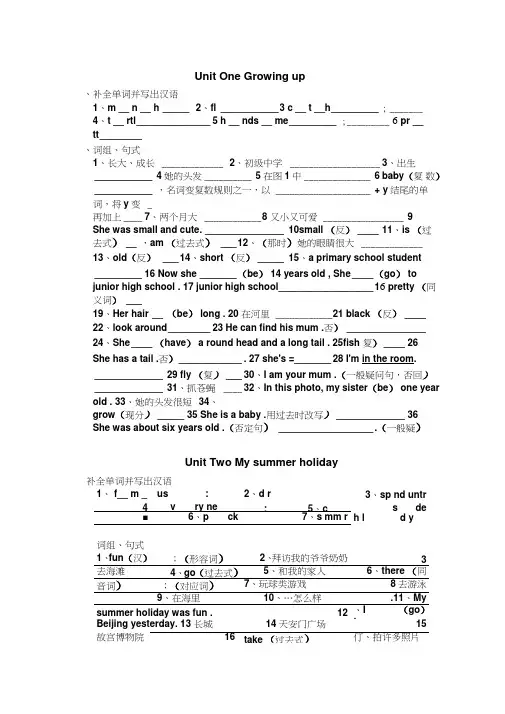
Unit One Growing up、补全单词并写出汉语1、m __ n __ h _____2、fl ___________ 3 c __ t __h _________ ; _______ 4、t __ rtl ______________ 5 h __ nds __ me _________ ; _________ 6 pr __tt ________、词组、句式1、长大、成长_____________2、初级中学___________________3、出生___________ 4她的头发__________ 5在图1中______________ 6 baby (复数) ___________ ,名词变复数规则之一,以____________________ + y结尾的单词,将y变_再加上____ 7、两个月大____________ 8又小又可爱_________________ 9She was small and cute. _______________ 10small (反) ____ 11、is (过去式) __ ,am (过去式)___ 12、(那时)她的眼睛很大_____________ 13、old(反)___ 14、short (反) _____ 15、a primary school student_________ 16 Now she _______ (be) 14 years old , She ____ (go) to junior high school . 17 junior high school __________________ 16 pretty (同义词)___19、Her hair __ (be) long . 20 在河里____________ 21 black (反) ____ 22、look around ________ 23 He can find his mum .否)_______________ 24、She ____ (have) a round head and a long tail . 25fish 复) ____ 26She has a tail .否)____________ . 27 she's =_______ 28 I'm in the room._____________ 29 fly (复) ___ 30、I am your mum .(一般疑问句,否回)_____________ 31、抓苍蝇____ 32、In this photo, my sister(be) one year old . 33、她的头发很短34、grow(现分)_____ 35 She is a baby .用过去时改写) _____________ 36 She was about six years old .(否定句)__________________ .(一般疑)Unit Two My summer holiday补全单词并写出汉语1、f__ m _4us :v ry ne2、d r: 5、c3、sp nd untrs de■6、p ck 7、s mm r h l d y词组、句式1、fun (汉);(形容词)2、拜访我的爷爷奶奶 3 去海滩4、go(过去式)5、和我的家人6、there (同音词);(对应词)7、玩球类游戏8去游泳9、在海里10、…怎么样.11、My summer holiday was fun . 12 、I (go)toBeijing yesterday. 13 长城14天安门广场15 故宫博物院16、take (过去式)仃、拍许多照片式) ____ 21、You can see my photos一般疑) __________ 22 during the summer holiday _____________ 23、在八月___________ 24、visit(过去式)_____ 25去拿______ 26乘飞机 _____________ 27、英国(缩写) ____ 28 回到访朋友).Unit Three Healthy and unhealthy、补全单词并写出汉语1、h ____ l th _________ ; ______2、__ nh ____ lth _________ ;_______ 3h mb rg r ________________ 4 c l _________ 5 y st rd y _______________6、fr ____ t______7、p __ e ___ 8 p __ zz ______ 9 s __ndw __ ch ______ 10、v __ g __ t __ bl __________ 11 ch __ ck __ n _________、词组、句式1、少量的______________2、炸鱼薯条_________________3、今天早晨____________ 4吃早饭 ___________ 5、I (have) two apples yesterday.6、healthy (反)_____7、I had two hamburgers for breakfast. _________8、I had two hamburgers 否) ___________ 9 He had two hamburgers for breakfast. ___________ 10、喝一些牛奶_______________ 11、吃一些水果________ 12、吃少量的肉 _____________ 13太多的肉 ________________ 14 What about you?(汉)_____________ 15、I didn 'have breakfast this morning.(肯) ___________ 16 吃午饭 _____________ 17、吃晚饭__________ 18每天________ 19 一个鸡蛋和一个苹果 ____________________ 20 Breakfastis important ____ u s, I ______ (have) some bread and some ___ (milk) this morning, I also had an ______ and an apple. 21、Joe had two _______ and some cola, That is not ______ . He should drink some _____ and eat some _____________ .22、sandwich复)________ 23、大量的米饭_______ 24 吃一些鱼_______ 25吃少量的甜食_____________ 26做运动____ 27、又强壮又健康_____________ 28许多糖___________ 29 Lily and Bob play sports very often.否)_____________ 30 fat (反) __ 31、健康的孩子们_________ 32 have poor eating habits _____________ 33 今天早上早餐你吃什么了?_ 我吃了一些面包,喝了一些牛奶_______________ 34喜欢吃饺子 ________________ 35昨天,基蒂早餐喝了一些牛奶,吃了一些面包。
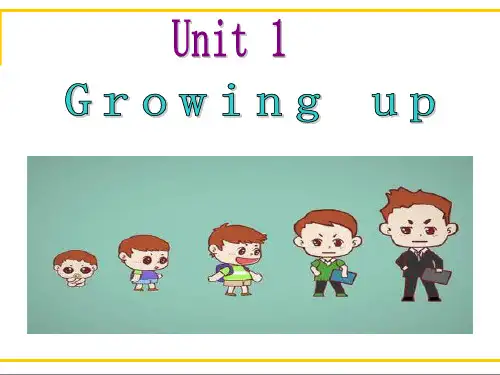
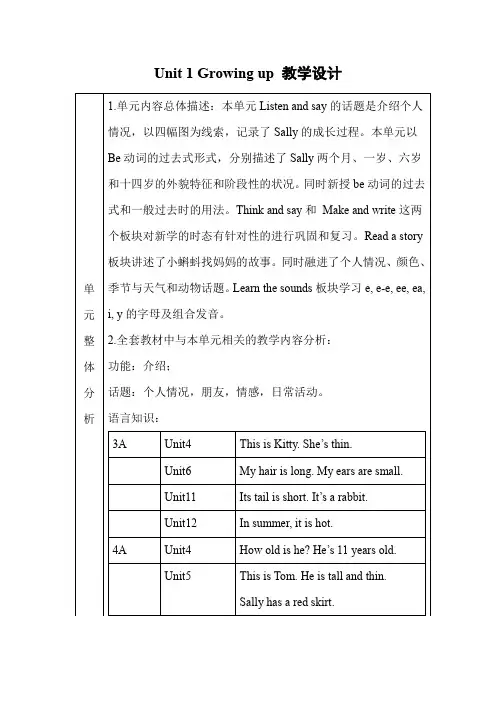
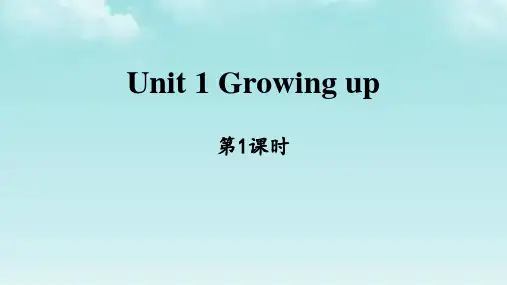
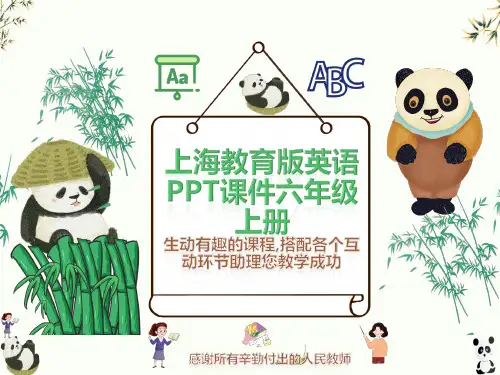

Unit 1 Growing up 一、基本知识点(一)词汇:month [mʌnθ]cute [kjuːt]handsome ['hæns(ə)m]pretty ['prɪtɪ]catch [kætʃ](二)短语:grow upjunior high school基数词+year(s)/month(s)+ oldat primary schoollook aroundlook likea round headcatch fliesbe born(三)句型:1. Her hair was short and her eyes were big.她的头发很短并且眼睛很大。
2. In Photo 2, she was ... months/years old.在第二张照片里,她有...月/岁大。
3. She was small and cute.她既小巧又可爱。
4. Little Justin was born in the river.小贾斯汀出生在河里。
5. Your mun has four legs.你的妈妈有四条腿。
6. She can catch flies.她会捕捉苍蝇。
7. What does his mother look like?他的妈妈长什么样子?(四)重难点、易错点:1. 一般过去时is/ am-----was are-----were(否定形式缩写)2. 一般现在时---单三( goes, has, meets)3. 名词变复数fly-----flies4. 复习器官词汇mouth tail 等5. 音标:[i:] [ɪ ]6. 写作:学会如何描述一个人在不同的年龄(年龄、外貌、所在学校)My father is _________________________________________ 年龄He was _________________________________________ 职业或所在学校His ____________________________________________ 外貌特征二、典型例题1. The turtles were born ________ the river.A. atB. inC. under【解析】答案:B 根据句意:“乌龟出生在河里”。
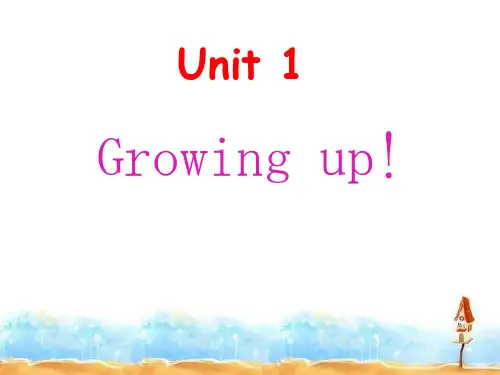
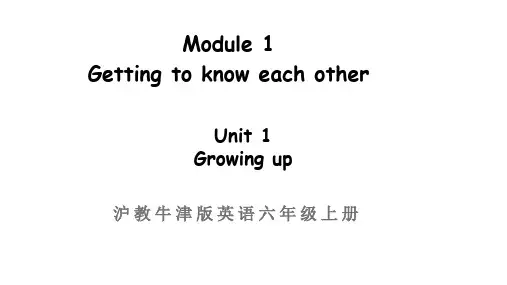

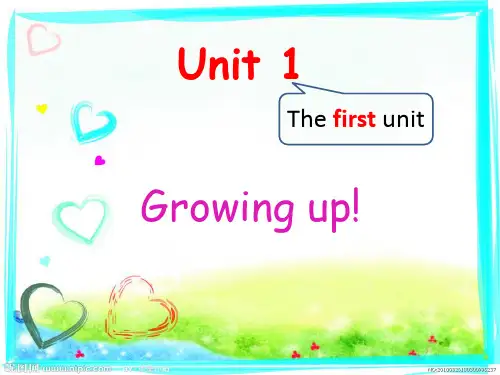
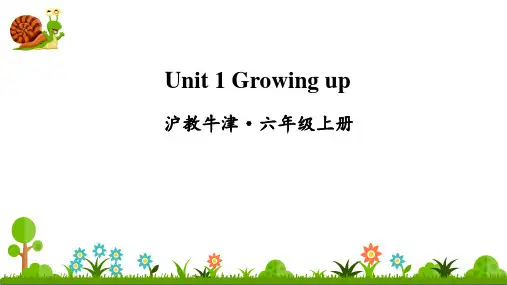
Module 1 Getting to know each otherUnit 1 Growing up.◆教材分析本课是教材Module 1 Unit 1的教学设计。
本单元的语言功能项目是To talk about the grow up of themselves.主要话题是To think about the ways of know the world,本课内容贴近学生的生活和学习实际,为学生操练对话创设了一个真实的语言情景,有利于学生在比较接近实际的情景中听听说说,从而培养他们运用英语进行交际的能力。
◆教学目标【知识目标】1. To talk about students’ things of grow up.2. To think about the ways of know the world.【能力目标】To use the sentences in context.【情感目标】利用多种游戏或活动形式培养学生对英语学习的浓厚兴趣。
◆教学重难点◆【教学重点】To think about the ways of know the world.【教学难点】通过阅读活动,引导学生通过阅读抓住关键信息,了解故事大意,通过角色扮演,让学生巩固和运用本单元所学核心词汇和句型。
◆课前准备◆Tape recorder, Multimedia◆教学过程Step 1. Lead-inFree talkT: How old are you?How tall are you?Do you remember your height when you first came to this school?Step 2. Listen and readPlay the tape for students to listen and answer.Ask the students to listen to the comic strips and answer the following questions:1.What is on Eddie’s mind?2.Will Eddie build his house by himself?Step 3. PresentationT: You are growing older and taller, so ,you are growing up.What comes into your mind when talking about “growing up”?Encourage the students to talk about the words or sentences about “growing up”?Q: Do you feel happy to grow up?Do you want to grow up?Teacher says: Just like what Eddie said,“Growing up is hard.”Growing up also means that you learn more about the world.How do you learn about the world?Show them some pictures to encourage the students to say out the full sentences and finish Part A.Step 4. PracticeListen to part B.Ask: How does Mill learn about the world? Why?How does Simon learn about the world? Why? Work in pairs to practice the dialogue.Sample conversation :S1: How do you learn about the world?S2: I like to learn about the world from films.S1: Why do you like to learn that way?S2: Because I can see...Step 5. SummaryDiscussion: What have we learned in this class? Show time.1.on one’s mind.2.be worried about(doing).3.Growing up is hard.4.You have been happy since I first met you.5.wake sb. up.6.learn that way.7.through the Internet.8.as soon as.9.a great deal of.Step 6. HomeworkRevise the contents we’ve learned in this period . Recite the comic strip fluently .Finish exercises in workbook for each period.◆教学反思略。
Unit1 Growing up一、重点词汇及拓展1. month n. 一个月的时间;月份拓展:year 年season 季节week 周day 日hour 小时minute 分钟second 秒辨析: mouth 嘴e.g. The baby is three months old. 这个婴儿三个月大。
2. cute adj. 可爱的巧记:cut(切)+e同义词:lovelye.g. This baby is very cute. 这个婴儿很可爱。
3. pretty adj. 漂亮的pretty-prettier(比较级)-prettiest(最高级)同义词:beautiful-more beautiful(更漂亮的)-most beautiful(最漂亮的)反义词:ugly 丑陋的e.g. This little girl is very pretty . 这个小女孩非常漂亮。
4. handsome adj. 英俊的;帅气的巧记:hand(手)+some(一些)拓展:cool 酷的good-looking 好看的e.g. My father is very handsome. 我爸爸很英俊。
5. turtle n. 乌龟(海龟)拓展:tortoise 乌龟(陆龟)6. catch v. 逮住;捕捉(第三人称单数:catches 过去式:caught)catch flies 抓苍蝇catch bad people 抓坏人catch the bus 赶公交7. fly n. 苍蝇(复数:flies)v. 飞(过去式flew)fly a plane 开飞机8. grow up 长大;成长拓展: grow 种植grow crops 种植庄稼e.g. I want to be a teacher when I grow up. 当我长大的时候,我想成为一名教师。
9. junior high school 初级中学primary school 小学senior high school 高中;university 大学 a universityat primary school 在小学e.g. My brother is a junior high school student. 我哥哥是一名初级中学学生。
沪教牛津版六上《Growing up》教案教学目标:知识目标1.能听、说、读、写本课的核心词汇:grow up, cute, pretty, handsome2.能熟练掌握核心句型:She was two months old.She was small and cute.Her hair was short and her eyes were big.能力目标1.能听懂对Sally不同成长阶段年龄和特征的描述。
2.能综合运用所学语言描述人在不同成长阶段的情况。
情感目标对所学内容能主动联系生活实际,能尽量用英语交流,培养学生的小组合作精神。
重点难点:1.能在语境中运用本课的核心词汇和句型。
2.在句型His/her...was/were... 中根据名词的单复数形式正确使用was 或were.教学用具:录音机、自制课件、照片等教学过程:StepⅠWarm up and revision(热身与复习)1. Greetings.2. Do some warming-up exercises.3. Review the numbers.Step ⅡPresentation and practice(呈现新语言知识和练习)1. Lead in.T: How old are you?S1: I’m eleven years oldT: You’ll be twelve years old next year. You’re growing up.2. Show some photos and introduce the new words.3. Learn to say and use the words.4. Talk about the photos of Sally.5. Watch the screen and learn to say the sentences.6. Ask pupils to practise in groups .Sept ⅢLearn the story (学习课文)1. Read the story and learn to say the useful sentences.2. Watch the cartoon.牛津版六上《Great cities of the world》教案教学目标:1.能听、说、读、写本课的核心词汇:capital , north, south, east,west, Beijing, London and Tokyo2.能熟练掌握核心句型:-- How long does it take to get to Shanghai from Beijing by train?-- It takes about five hours.3.能介绍城市的地理位置。
上海教育版英语六年级上册Unit1《Growingup》word教案沪教牛津版六上《Growing up》教案教学目标:知识目标1.能听、说、读、写本课的核心词汇:grow up, cute, pretty, handsome2.能熟练掌握核心句型:She was two months old.She was small and cute.Her hair was short and her eyes were big.能力目标1.能听懂对Sally不同成长阶段年龄和特征的描述。
2.能综合运用所学语言描述人在不同成长阶段的情况。
情感目标对所学内容能主动联系生活实际,能尽量用英语交流,培养学生的小组合作精神。
重点难点:1.能在语境中运用本课的核心词汇和句型。
2.在句型His/her...was/were... 中根据名词的单复数形式正确使用was 或were.教学用具:录音机、自制课件、照片等教学过程:StepⅠWarm up and revision(热身与复习)1. Greetings.2. Do some warming-up exercises.3. Review the numbers.Step ⅡPresentation and practice(呈现新语言知识和练习)1. Lead in.T: How old are you?S1: I’m eleven years oldT: You’ll be twelve years old next year. You’re growing up.2. Show some photos and introduce the new words.3. Learn to say and use the words.。